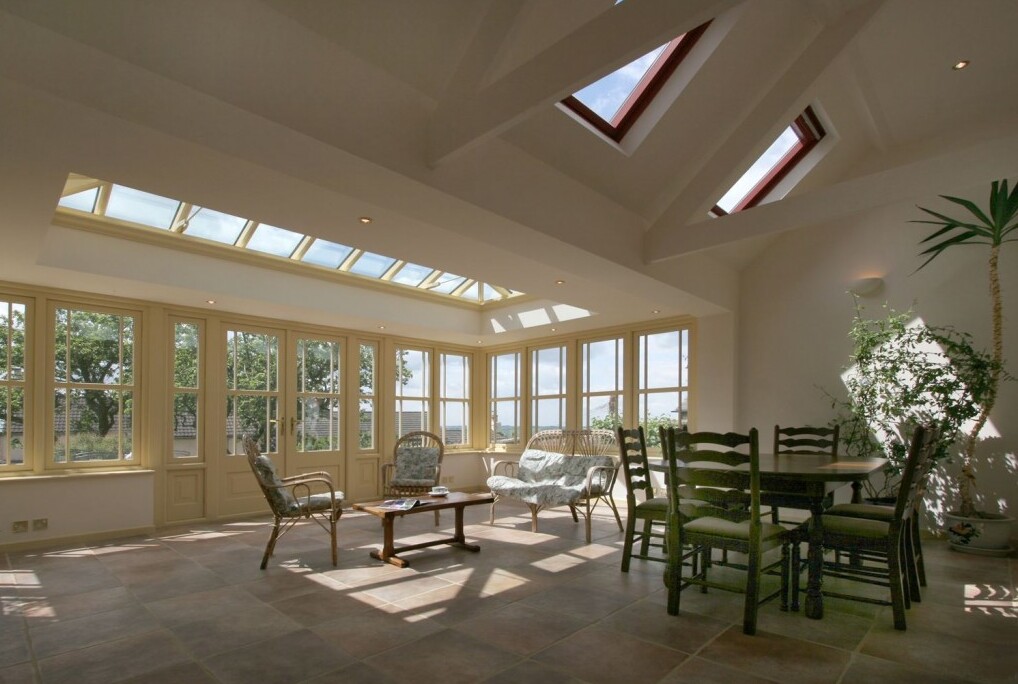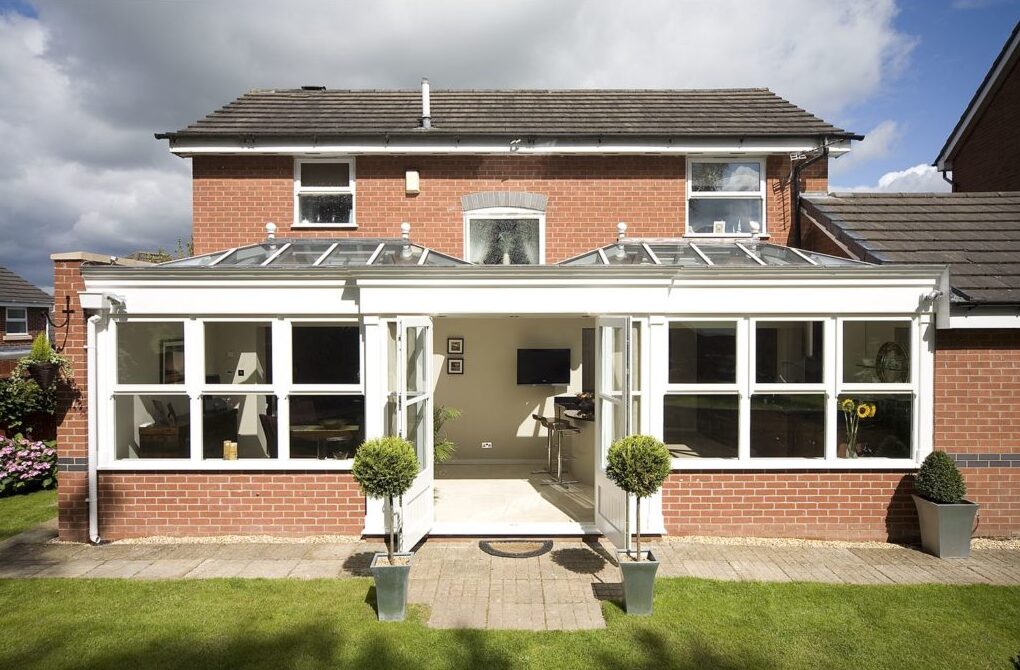
When it comes to selecting new windows for your home (or replacing existing windows), there are a myriad of window frame choices to select from, but two of the most popular options are uPVC (unplasticised Polyvinyl Chloride) windows and timber windows.
Both options have their unique advantages and appeal, but making the right choice requires considering various factors, including durability, energy efficiency, aesthetics, and budget.
In this article, we’ll delve into the differences between uPVC windows and timber windows, helping you make an informed decision for your home.
But first, let’s have a quick refresher exploring and understanding the two different materials.
uPVC windows, short for unplasticised Polyvinyl Chloride, are a popular choice for homeowners seeking a practical and cost-effective window solution. These windows are made from a rigid form of PVC, which makes them highly durable and resistant to external elements.
uPVC windows are known for their excellent energy efficiency due to their exceptional insulation properties. The frames of uPVC windows effectively trap air, creating a thermal barrier that prevents heat loss during winter and reduces heat gain during summer.
Moreover, uPVC windows are virtually maintenance-free, making them a convenient option for busy homeowners. Unlike traditional wood windows, uPVC windows do not require painting or staining, and they don’t rot or corrode over time. This durability ensures that uPVC windows maintain their appearance and functionality for many years, even in harsh weather conditions.
Timber windows, also known as wooden windows, have a traditional charm and timeless elegance that add character to any home.
The hardwood timber windows from Windows & Doors UK, for example, are crafted from sustainably sourced European hardwood, (certified by the Forest Stewardship Council) which provides warmth and a sense of natural beauty. Timber windows are popular among homeowners who appreciate the traditional and classic look that wood offers.
As we’ve mentioned briefly, one of the most attractive features of timber windows is their eco-friendliness. Wood is a renewable resource, and when sourced from sustainably managed forests, like ours is, it makes replacing your windows an environmentally conscious choice.
Timber windows also have a relatively low carbon footprint compared to windows made from other window materials like PVC. Additionally, the production of wood windows consumes less energy, making them a greener alternative. Plus, once installed, they’re incredibly energy efficient.
To ensure the longevity of timber windows, regular maintenance is essential. This includes periodic painting or staining to protect the wood from moisture, pests, and the effects of UV rays. When properly cared for, timber windows can last for decades, maintaining their natural beauty and enhancing the overall aesthetics of your home in the years ahead.
OK, so that’s what uPVC and timber windows are, so now let’s explore each type of window in a side by side comparison, comparing each one on the main deciding factors.
Let’s explore these in more depth…

uPVC windows are renowned for their durability, requiring very little maintenance. The inherent properties of uPVC, such as resistance to moisture, rot, and corrosion, contribute to their lifespan. These windows can withstand harsh weather conditions, including heavy rain, strong winds, and extreme temperatures, without showing signs of wear and tear.
Good quality timber windows are also renowned for their durability, as long as they’re properly looked after. While wood is naturally durable, it can be vulnerable to moisture and pests.
At Windows and Doors UK, we treat all of our hardwood and timber windows for the utmost durability and highest-quality. Simply repaint your wood windows after 10 years, and then again every few years, or stain them to help them remain functional and visually appealing for decades to come.
uPVC windows have come a long way in terms of design options. Homeowners can now choose from a wide array of colours, finishes, and styles to suit their home’s architecture and interior decor. uPVC windows offer a clean and modern appearance, and the frames can be tailored to match various design preferences.
Timber windows have a natural beauty that exudes warmth and timelessness. The rich texture and grain patterns of wood create an inviting ambiance, making timber windows a perfect fit for traditional and rustic home styles. The versatility of wood also allows for customisation, and you can opt for different wood types and finishes to achieve your desired look.
uPVC windows are generally more budget-friendly than timber windows. The lower cost of materials and the simpler manufacturing process contribute to their affordability. For homeowners on a tight budget or looking for a cost-effective window solution without compromising on quality, uPVC windows often prove to be an attractive choice.
The cost of timber windows, while more expensive, offer a different value proposition. The higher cost is attributed to the quality of wood used and the craftsmanship involved in manufacturing and installing them. Timber windows can be seen as an investment, as they not only last for 30 years, but have the potential to add significant value to your property. Additionally, the aesthetic appeal and natural beauty of timber windows can be an enticing feature for potential buyers, contributing to increased resale value.
uPVC windows are energy efficient due to the air-tight seal created by uPVC frames which helps to minimise heat transfer between the interior and exterior of your home. As a result, you can enjoy a more comfortable living space while reducing your energy consumption and utility bills. When you add in double glazing, their energy efficiency increases further.
Wood is a naturally insulating material, meaning timber windows offer good thermal insulation. With its natural insulating properties, the thermal efficiency of wood can help maintain a stable indoor temperature. Double glazed windows or triple glazing with wooden frames will contribute to energy savings and will create a cosy atmosphere inside your home for many years to come.

The environmental impact of uPVC windows is a hot topic of debate. With only 3% of uPVC windows recycled at the end of their life (the majority of them are incinerated, releasing hazardous chemicals into the environment), they’re not exactly eco-friendly.
Plus, PVC is a type of plastic derived from fossil fuels, and its production has been associated with certain environmental concerns. However, their energy efficiency does contribute to lower energy consumption, indirectly reducing greenhouse gas emissions.
Timber windows, on the other hand, cause no such quandary, with their positive environmental profile when the wood is sourced responsibly. Wood is a renewable resource, and well-managed forests can replenish the harvested trees. Timber windows have a lower carbon footprint compared to windows made from non-renewable materials. By choosing sustainably sourced wood and supporting responsible forestry practices, you can make a more eco-friendly choice with timber windows.
Both uPVC and timber windows offer commendable noise insulation against outside noise, contributing to a quieter and more peaceful indoor environment. The dense construction of uPVC frames and the natural properties of wood both help reduce external noise infiltration, creating a tranquil living space.

uPVC windows are resistant to various weather elements, such as rain, wind, and UV rays. The material does not corrode or warp when exposed to moisture, ensuring that uPVC windows retain their shape and functionality over time. This weather resistance makes uPVC windows ideal for homes in regions with varying climates and weather conditions.
Timber windows also offer good weather resistance, especially when they are properly maintained. With regular care and attention, such as applying weather-proof finishes, timber windows can endure different weather conditions without compromising their structural integrity.
uPVC windows provide a wealth of customisation options for homeowners. They are available in various colours, finishes, and styles, catering to diverse architectural preferences. Whether you prefer a sleek, modern design or a more traditional appearance, uPVC windows can be tailored to suit your taste.
Timber windows also offer a high degree of customisation. Wood can be easily shaped and crafted, allowing for custom designs that match the specific architectural style of a home. Timber windows can be stained or painted in different hues to blend harmoniously with the overall aesthetics of the property. Each timber window from Windows & Doors UK, for example, is crafted in our dedicated joinery here in the UK, meaning you can get exactly what you want, from us.
uPVC windows can positively impact a property’s resale value, especially for homeowners who prioritise cost-effectiveness and energy efficiency. Buyers often appreciate the benefits of uPVC windows, such as their low maintenance requirements and potential energy savings. uPVC windows can enhance the overall appeal of a home, making it a more attractive option for potential buyers.
New windows can improve the resale value of your home, new wooden replacement windows can make the value soar with their timeless appeal and natural beauty. Many homebuyers are drawn to the classic charm of timber windows, making them a sought-after feature not just in older or period properties, but in modern homes too. Additionally, the eco-friendliness of wood windows can be an appealing factor for environmentally conscious buyers.
Ultimately, the decision whether to opt for uPVC windows or timber windows, is down to your specific needs, individual preferences, your budget, and your architectural style.
Yes, uPVC windows offer practicality, low maintenance, and energy savings, making them a cost-effective choice for many homeowners, but (and we are biased about this), timber windows boast timeless beauty, eco-friendliness, and a multitude of customisation options, making them a firm favourite among those UK homeowners who seek a classic and elegant look for their homes.
At Windows and Doors UK, we do not offer uPVC windows, favouring timber and hardwood windows for their quality, durability and appearance.
To find out more about our hardwood and timber windows, or to get a quote, contact us today.